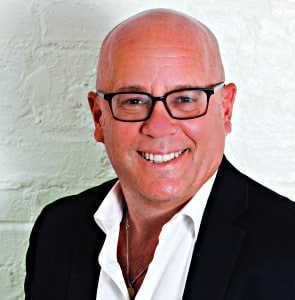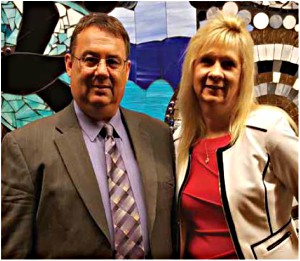
(By Gary Krantz) From the 1940s through 1998, WALL-AM was the “go to” station for New York’s Hudson Valley. Yet for almost 20 years, its original home, Middletown, was without live, local programming. That is, until Bud Williamson of Neversink Media Group resurrected the heritage station. For the last few years, the station transmitted from studios in Poughkeepsie. Now, it’s back home in Middletown.
Williamson has an impressive track record of making his stations profitable, even in the face of increasingly competitive challenges. And he’s passionate about keeping them deeply local, even as more radio is nationally programmed. Here’s his take on why hyperlocal radio will be the way forward.
Gary Krantz: Give us a quick back story on how you brought back WALL.
Williamson: When we bought WDLC & WTSX in 2011, we basically bought assets: no revenue, no formats, it was run to the ground. We put a Country format on WDLC and Classic Hits on WTSX. Both changes were received well. But I finally decided WTSX had to be something that touches the community, and that’s where “Pocono 967” was born, along with new call letters WABT. We’ve got Gary in the Morning — very hyper-local. He may play two or three songs an hour; the rest is people coming in to talk about a blood drive, a tricky tray, or what the fire department is doing. This became our model.
Fast-forward a few years to WALL radio. I have these translators around the

Hudson Valley, and WALL ran Sports, then Spanish, so I called the manager and said, “Hey, I’ve got some translators, let’s do a deal.” So we ended up doing a swap for WALL.
That gave me the ability to bring WALL back with a Classic Hits format, local news, local talent. We’ve expanded our listenership to include the entire Hudson Valley. Being as close as we are to New York City, there’s no way to get another station; the only way to create this is by using translators.
Krantz: What’s your ultimate footprint, with all those translators?
Williamson: We wanted to make a big footprint, but one thing I’ve learned is we really have two audiences: the listeners, but also the businesses. A lot of the buys we got in the ’80s, ’90s, we don’t get anymore. We’re fighting harder for what we get, and we make sure that we superserve business. That’s something we’ve stuck with.
If a new business comes to town, we always give them an opportunity to get on with the morning show and talk about what they’re doing; we’re playing to them, which is why the bigger footprint is helpful.
Krantz: You’re bringing hyper-local content to the Hudson Valley, competing with stations that are owned by some of the biggest major groups. Expand a little bit on how to compete.
Williamson: I don’t want to call it that “oldtime feeling,” but where group stations play a narrow list of music, I don’t limit my jocks to 15 or 20 seconds. When they crack the mic, they can say what they want. It’s like the old days. This is what we call “communicating.”
For example, we have the mayor on regularly. We have the local Chambers. They can talk about business and what they’re seeing, and they bring businesses on as well.
Krantz: How important is digital to your strategy?
Williamson: This is one thing that we’re up against when we’re out selling. We’re doing Faceboo k, SEO, we’ve got a website, we go on LinkedIn. So whether it’s with simple banner ads or developing a website for a business or helping them publicize what they’re doing on Facebook, digital is very important.
Krantz: Going forward, do you see more acquisitions? Are they just in radio, or are you looking at other kinds of audio entertainment, maybe even digital or video?
Williamson: There are plenty of opportunities to buy stations. But are they the right ones? If we do something, it’s really got to fit our model.
Krantz: What’s your take on the current state of the radio business, audio entertainment, and local radio specifically?
Williamson: It all comes down to content. The radio business as a whole I think is strong, but we have to make sure that kids and those in their 20s never forget that they can turn on the radio and hear what they want to hear. There’s a lot of online competition out there, but I don’t know if anybody is happy just listening to Pandora three hours at a time. I think we need to raise the bar and provide more local content.
Krantz: Why?
Williamson: If you have a host you feel like you’re friends with, you’re going to listen all afternoon. The radio is not going to be in your way, you’re not going to be inclined to push the button. We keep commercial breaks to no more than two minutes. We want to provide something compelling for businesses as well.
Krantz: What are the biggest challenges you face?
Williamson: We’re always trying to generate revenue. We have a lot of ideas from a programming standpoint, but it’s harder to generate business, to get the right salespeople who will keep digging. I think we’ve found our programming; that’s the easy part. But it’s always generating revenue, it’s always our challenge in this day, plus finding the right people to work for us.
Krantz: What advice do you have for young entrepreneurs in the business?
Williamson: If you have a parent or grandparent that worked anywhere from the 1930s into maybe the ’60s, ask them about their work ethic. For entrepreneurs, you have to get into this knowing you’re going to spend a lot of time getting it started. I think this idea is also helpful if somebody wants to get into the business, whether on-air or on
the business side in selling.
Throw out all of this stuff about “overtime,” wages, and all of that. If you want to get the most out of this business, you’re going to put time into it. It will reward you, but mainly — and this sounds mean — as you make others successful, whether it’s a business owner or an audience. That’s where you’ll have your success. And then the
money will follow.
You’re going to work hard. Don’t close down at 5 o’clock on a Friday. You’ll have to check e-mail, come up with ideas through the weekend. Maybe that’s your time to write out a plan or develop a concept. So my best advice is to make sure you have the old-fashioned work ethic. That’s how to succeed.
Gary Krantz is the CEO and Founder of The Krantz Media Group, KMG Networks and KMG Music. He can be reached at [email protected]







I commented on the NY Radio Board that I was up in the Catskills on business and decided to check out the local media. I came across WALL on TuneIn and was hooked. I made it a favorite and found myself listening all weekend here on Long Island. Bud appears to be doing a great job, especially for a 61 year old guy who grew up with Brucie, Ingram and WNEW-FM and WPLJ.